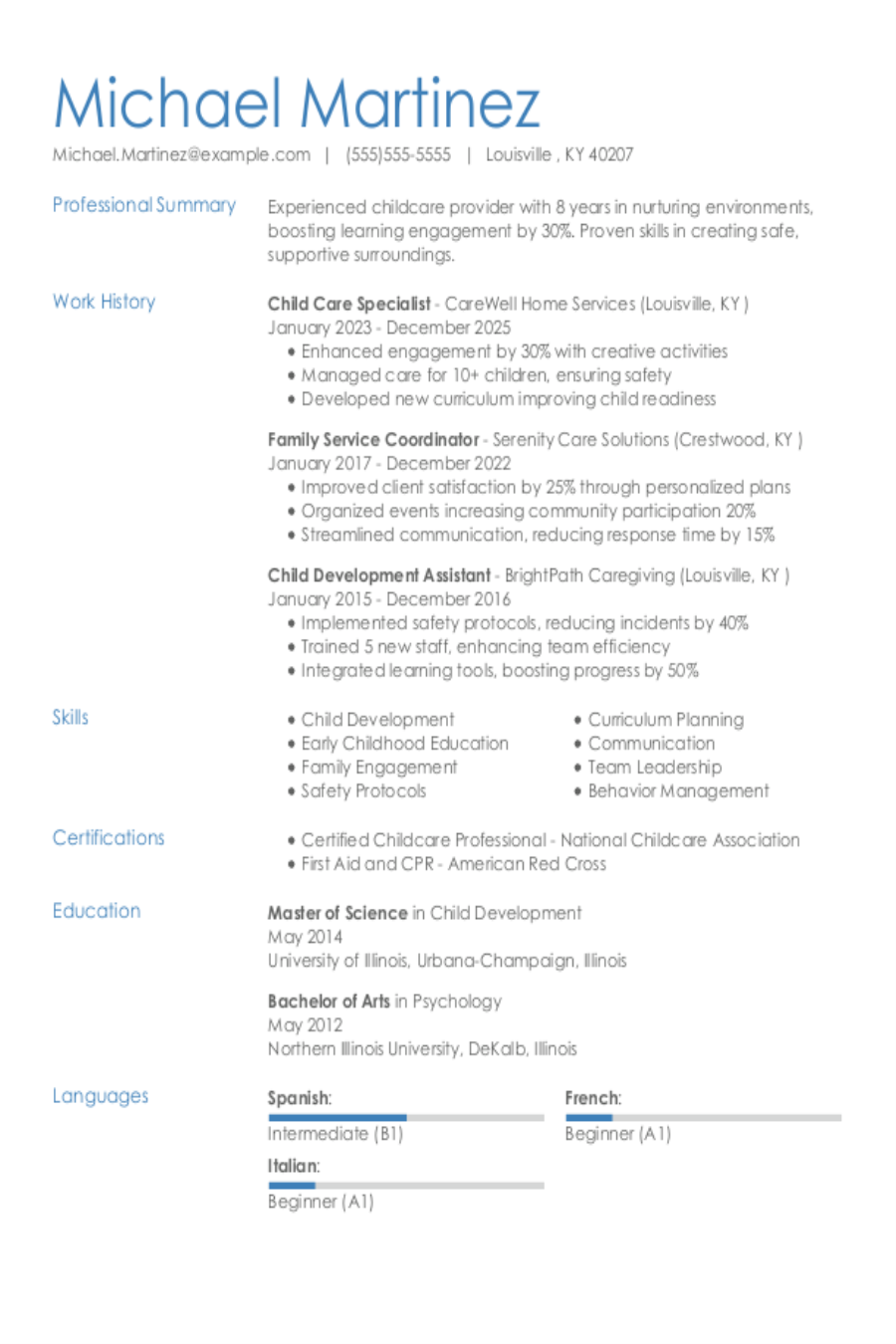Table of contents
Popular Engineering Project Manager Resume Examples
Entry-level engineering project manager resume
An entry-level resume for an engineering project manager should highlight relevant coursework, internships, leadership skills, certifications, and volunteer experiences to showcase organizational and problem-solving abilities.
Focuses on goals: The job seeker demonstrates a strong foundation in project management through roles that emphasize their commitment to efficiency and team leadership while pursuing professional growth in the field.
Prioritizes readability: Opting for a clean, straightforward simple resume template improves readability, enabling recruiters to swiftly pinpoint relevant qualifications and achievements without unnecessary distractions.
Mid-career engineering project manager resume
A mid-career engineering project manager resume should emphasize a strategic mix of relevant accomplishments, key skills, and ongoing professional development to demonstrate leadership and adaptability in managing diverse projects.
Begins with a powerful summary: This resume's professional summary highlights essential qualifications, showcasing the candidate's extensive experience in leading compelling projects and optimizing resources.
Includes mix of skills: This resume effectively highlights a mix of hard skills, such as project management and budgeting, alongside soft skills like team leadership and strategic planning, presenting a well-rounded applicant.
Experienced engineering project manager resume
An experienced engineering project manager resume should prioritize highlighting key achievements and leadership roles to clearly demonstrate the job seeker's career growth and project successes.
Follows traditional format: The chronological resume format effectively highlights the job seeker's extensive experience, presenting a clear narrative of their career progression through well-defined roles and achievements that demonstrate growth and expertise in project management.
Optimized for ATS: The resume uses a polished and organized template that effectively combines a professional header with an ATS-friendly resume format, ensuring optimal readability for both recruiters and automated systems.
No experience engineering project manager resume
A resume for an applicant with no experience should highlight relevant skills, certifications, and any leadership roles in projects or team activities to showcase their potential and readiness for the position.
Favors clarity over complexity: The resume's clean design effectively highlights relevant experience and skills, allowing qualifications to stand out without unnecessary distractions.
Leads with education: Opening with the candidate's degrees and highlighting relevant coursework in project management in the accomplishments section helps establish this candidate's expertise.
More resume examples
Additional Guides
Engineering Project Manager Resume Template
Looking to organize your career path? Start with this professional engineering project manager template, ready for you to personalize with your unique details.
Yuki Chen
Los Angeles, CA 90005
(555)555-5555
Yuki.Chen@example.com
Professional Summary
Dynamic Project Manager with 7 years in strategic roles. Proven record of delivering projects on time and enhancing team engagement. Expertise in agile methods and cost management.
Work History
Project Manager
InnovateTech Solutions - Los Angeles, CA
January 2023 - September 2025
- Led team to complete 15% ahead of deadline
- Reduced project costs by 10% via strategic planning
- Improved stakeholder engagement by 25%
Program Coordinator
VentureGrowth Inc. - Lakeside, CA
June 2020 - December 2022
- Managed project scope to align with company goals
- Increased team productivity by 20% using agile
- Facilitated 30+ client meetings annually
Assistant Project Specialist
FuturePath Enterprises - Lakeside, CA
October 2018 - May 2020
- Supported execution of projects under budget
- Streamlined reporting process by 40%
- Successfully coordinated 12 project launches
Skills
- Project Management
- Agile Methodologies
- Stakeholder Engagement
- Cost Management
- Scope Management
- Team Leadership
- Process Improvement
- Risk Analysis
Certifications
- Certified ScrumMaster - Scrum Alliance
- PMP Certification - Project Management Institute
Education
Master of Business Administration Project Management
University of Leadership Chicago, IL
May 2018
Bachelor of Science Management
State University Springfield, IL
May 2016
Languages
- Spanish - Beginner (A1)
- French - Intermediate (B1)
- German - Beginner (A1)
Must-Have Skills on an Engineering Project Manager Resume
A strong skills section is essential for a standout resume.
Leadership and management professionals guide teams, shape strategy, and drive results. The skills you highlight should reflect your ability to align people and priorities and move goals forward. The aim of your resume is to show how your leadership skills contribute to long-term growth and organizational success.
The following data highlights the most sought-after hard and soft skills for project managers according to Resume Now’s internal resume database.
When you’re ready to improve your resume, try using our AI Resume Skills Generator. It recommends tailored hard and soft skills based on your job title, helping you create a comprehensive and personalized skill set.
Writing Your Engineering Project Manager Resume
Having explored these impressive resume samples, you're now equipped to make your own resume. We'll take you through the detailed steps on how to write a resume, ensuring you understand each section along the way.
List your most relevant skills
A compelling skills section on your project manager resume should highlight both technical proficiencies and essential soft skills like leadership, communication, and strategic thinking. By carefully selecting these attributes, you can effectively demonstrate that you are well-equipped to navigate the complexities of project management.
To improve your chances of getting noticed by recruiters and applicant tracking systems, include keywords from the job listing in your skills section. This approach not only aligns your expertise with what employers are seeking but also ensures that you stand out as a qualified applicant who meets their specific needs.
Example of skills on an engineering project manager resume
- Proficient in managing project timelines and budgets to ensure successful delivery
- Adept at leading cross-functional teams to achieve project goals
- Strong communicator with excellent stakeholder management skills
- Analytical thinker with a focus on problem-solving and innovation
Highlight your soft skills on your resume. While technical prowess is important, employers highly value interpersonal abilities because they're challenging to teach and can significantly impact team dynamics.
Highlight your work history
A strong work experience section should emphasize your achievements and the impact you’ve made in previous roles, rather than merely listing duties. Highlight specific projects or initiatives where you successfully applied key skills to effectively demonstrate your capabilities to potential employers.
When detailing each job entry, include critical information such as your job title, employer name, and employment dates. These details are necessary for establishing your professional history at a glance. Focus on measurable outcomes that showcase how you contributed to project successes or improved processes within the organization.
Example of an engineering project manager work experience entry
- Project Manager
Innovative Solutions Inc. - New York, NY
June 2019 - Present - Lead cross-functional teams to execute project plans on time and within budget, achieving a 95% on-time delivery rate
- Facilitate communication between stakeholders and team members, ensuring alignment on project goals and expectations
- Develop comprehensive project documentation including timelines, resource allocation, and risk assessments to improve project efficiency by 30%
- Mentor junior project managers in best practices for Agile methodologies, resulting in a 25% improvement in team performance metrics
- Identify opportunities for process improvements that improved productivity by streamlining workflows and reducing project lifecycle by 15%
Highlighting outcomes and achievements in your experience section effectively showcases your impact as an engineering project manager. Employers prioritize results over mere responsibilities, as quantifiable successes reflect your ability to lead projects to completion and solve challenges efficiently. This strategy not only emphasizes your skills but also differentiates you from other applicants by demonstrating real contributions to past employers.
Include your education
The education section of your engineering project manager resume should be formatted in reverse-chronological order, starting with your most recent degree. Include relevant degrees and certifications while omitting high school diplomas if you possess a bachelor's degree or higher.
For those with ongoing education or incomplete degrees, list your highest completed level along with an expected graduation date. Additionally, include bullet points that outline relevant coursework or academic projects demonstrating skills applicable to project management. This approach is particularly useful for current students or recent graduates aiming to showcase their educational achievements.
Common certifications for an engineering project manager resume
- Project Management Professional (PMP) – Project Management Institute (PMI)
- Certified ScrumMaster (CSM) – Scrum Alliance
- Agile Certified Practitioner (PMI-ACP) – Project Management Institute (PMI)
- PRINCE2 Practitioner – AXELOS
Sum up your resume with an introduction
Creating a compelling profile section on your resume is important for making a strong first impression. This section serves as your personal branding statement, setting the tone for your entire application and giving employers a snapshot of your qualifications and career aspirations right from the start.
If you have substantial experience in project management, a professional summary is the best choice. This summary allows you to highlight key accomplishments, leadership roles, and industry-specific skills that demonstrate your value to potential employers. If your experience is still growing, write a resume objective that underscores your commitment to learning and improvement.
Professional summary example
Results-driven engineering project manager with over 8 years of experience in leading cross-functional teams to deliver high-impact projects on time and within budget. Demonstrated expertise in risk management, resource allocation, and stakeholder engagement ensures successful project outcomes. Adept at using agile methodologies to optimize workflows and improve team collaboration.
Resume objective example
Enthusiastic project manager eager to use strong communication, problem-solving, and organizational skills to support a collaborative team environment. Committed to driving project success and improving efficiency through innovative planning and effective stakeholder engagement.
For a project manager position, your resume profile plays a key role in catching the attention of hiring managers and ATS systems. Carefully analyze the job description to include relevant keywords that highlight your skills and experiences. This strategic approach improves your chances of getting noticed in a competitive job market.
Add unique sections to set you apart
Incorporating optional resume sections can highlight your unique qualifications for project manager roles. These sections allow you to stand out by showcasing experiences that set you apart from other applicants.
Consider including relevant hobbies or volunteer work that reflect your professional values and skills. For instance, if you've led community projects or organized events, it emphasizes your leadership abilities. Sharing these experiences gives potential employers insight into your personality and working style, demonstrating how you thrive not just in a professional context but also in personal pursuits.
Three sections perfect for a project manager resume
- Languages: As a project manager, effective communication is important for team collaboration. Highlighting your language skills on your resume can improve your ability to connect with diverse stakeholders and navigate international projects smoothly.
- Volunteer Work: Including volunteer work on a resume not only highlights your dedication to community service but also demonstrates valuable skills like teamwork and leadership that employers appreciate. Showcasing your commitment to making a difference can truly set you apart.
- Accomplishments: As an engineering project manager, measurable results are important to demonstrate your ability to deliver successful projects. Present these achievements within your work experience section or consider adding a distinct accomplishments section to emphasize them.
5 Resume Formatting Tips
- Choose a format that matches your career stage.
Selecting the right resume format is important for showcasing your experience effectively. If you have extensive experience, a chronological format highlights your career progression best. For those just starting out, a functional resume emphasizes skills over work history. Consider a combination format if you want to show both expertise and relevant skills clearly.
- Pick a smart resume template.
Using a professional resume template can greatly improve the readability of your content. It allows hiring managers to quickly grasp your qualifications. If you prefer not to use one, ensure that your formatting remains clean and uses fonts that are easy to read for applicant tracking systems.
- Select an appropriate font.
To improve your resume's readability, opt for clear fonts like professional font. Choices such as Arial, Helvetica, or Georgia ensure both ATS compatibility and an appealing look for hiring managers.
- Use consistent formatting.
Ensure your resume features uniform margins and is left-aligned to create a polished and professional look that stands out to hiring managers.
- Keep your resume to one or two pages.
When crafting your resume, aim for clarity and brevity. While resumes should be one page long for most professionals, those with extensive experience may extend to two pages. Focus on highlighting key achievements and skills to keep it engaging and relevant.
Tools for Your Job Search
Are you gearing up to apply for that engineering project manager role you've been targeting? Before you hit submit, take advantage of our ATS Resume Checker. This powerful tool provides essential feedback on how your resume performs with the automated systems many organizations use to screen applications initially.
Seeking a way to elevate your resume further? Our AI Resume Builder offers personalized recommendations tailored specifically to your project management experience, along with professional templates designed to showcase your skills and achievements effectively.
Frequently Asked Questions
Last Updated: December 15, 2025
Absolutely. A cover letter is important as it adds depth to your resume and offers a unique chance to connect with employers. It allows you to convey your enthusiasm for the project manager role and highlight how your skills make you an ideal job seeker. So, take the time to write a cover letter that truly reflects your professional journey.
For a quick and effective way to create your cover letter, try our AI Cover Letter Generator. It’s designed to help you produce a tailored cover letter in minutes, complete with various cover letter template options that align perfectly with your resume, ensuring consistency in your application materials.
A resume is generally concise, spanning one to two pages, while a CV (curriculum vitae) can extend several pages and includes detailed information about your academic history, research contributions, publications, and professional experience. This makes the CV a more comprehensive document compared to the resume.
You typically need a CV when applying for specialized roles in academia, law, or medicine. If you find yourself needing to create a CV, our online CV Maker is an excellent solution. It provides various CV templates tailored for different industries and career levels, allowing you to craft a polished document quickly and efficiently.
An engineering project manager resume should ideally be one page long, as this is generally sufficient to highlight relevant skills and experience. However, seasoned professionals with extensive backgrounds may choose a two-page resume format to better showcase their qualifications and accomplishments.
An engaging LinkedIn profile is important for project managers seeking new opportunities. It helps you connect with industry professionals and effectively highlight your project management skills.
To improve your networking skills as a project manager, make it a priority to reconnect with past colleagues regularly. Joining relevant professional organizations can also open new opportunities. Additionally, keeping your LinkedIn profile current will ensure you remain engaged and informed about industry trends and developments.
Was this information helpful? Let us know!
Hailey is a career advice writer dedicated to helping job seekers excel in their careers.
More resources

15 Latest Resume Trends for 2026 + Examples
In our dynamic global economy the job market and the expectat...

AI-Resistant Careers Index 2026: 20 Jobs That AI Can’t Replace
Resume Now s latest report breaks down the most AI-proof caree...

60% of U.S. Workers Expect AI to Eliminate More Jobs Than It Creates in 2026
Resume Now s newest report shows growing concerns about the im...

Interview-Winning Entertainment Resumes Examples and Tips
Was this information helpful? Let us know ...



